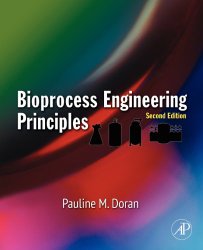Engineering Bookshelf
- Aerospace
- Biological
- Civil
- Chemical
- Environmental
- Electrical
- Materials
- Mechanical
- Petroleum
- Geoengineering
- Software

Bioprocess Engineering Principles
by Pauline M. DoranPublisher: Academic Press
ISBN: 012220851X
Check price @ amazon.com , amazon.ca , amazon.co.uk
Book Description
This welcome new edition covers bioprocess engineering principles for the reader with a limited engineering background. It explains process analysis from an engineering point of view, using worked examples and problems that relate to biological systems. Application of engineering concepts is illustrated in areas of modern biotechnology such as recombinant protein production, bioremediation, biofuels, drug development, and tissue engineering, as well as microbial fermentation.
The main sub-disciplines within the engineering curriculum are all covered; Material and Energy Balances, Transport Processes, Reactions and Reactor Engineering. With new and expanded material, Doran's textbook remains the book of choice for students seeking to move into bioprocess engineering.
All chapters thoroughly revised for current developments, with over 200 pgs of new material, including significant new content in:
New to this edition:
- Metabolic Engineering
- Sustainable Bioprocessing
- Membrane Filtration
- Turbulence and Impeller Design
- Downstream Processing
- Oxygen Transfer Systems
- Over 150 new problems and worked examples
- More than 100 new illustrations
Customer Reviews
By Josh
Great book. Info is not only easy to find, but plentiful. I recommend it to anyone going into biological engineering.
By Zelimir Kurtanjek
This is a comprehensive textbook on biochemical engineering suitable for students with only elementary knowledge of mathematics and engineering. It covers all the main aspects of the field but with minimal prerequisite knowledge of differential calculus and statistics. In the first part are given concepts of mass and energy balances, thermodynamics, hydrodynamics, heat and mass transfer, and unit operations. It is followed with reaction principles, kinetics of biological processes, heterogeneous reactions, and reactor engineering principles. Each topic includes practical examples and numerical solutions to problems. Students with biological background will find this book as the most appropriate introduction to biotechnology.